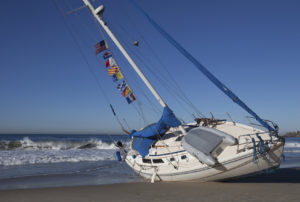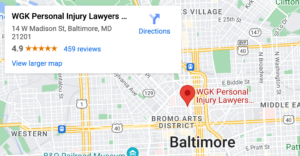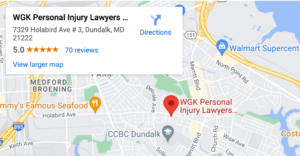
Have you been injured in a maritime accident in Baltimore, MD? Whether you are a dockside worker, cruise ship worker, or seaman, federal law offers several forms of protection to help you recover the compensation you need.
WGK Personal Injury Lawyers has been representing victims injured in maritime accidents for more than 40 years.
Contact our Baltimore office to schedule a free consultation, you can give us a call at (410) 837-2144 to speak with a Baltimore maritime accident lawyer at WGK Personal Injury Lawyers.
Table of Contents
How WGK Personal Injury Lawyers Can Help with a Maritime Accident Case

Not all personal injury lawyers in Baltimore have the experience and knowledge necessary to handle maritime injury cases properly.
Maritime law is a very complicated and specialized area of law. Depending on the details of your case, you may be eligible to file your case under one or several legal doctrines, some offering better benefits than others.
At WGK Personal Injury Lawyers, we have represented injured maritime workers and passengers for over 40 years. Our Baltimore maritime injury lawyers have a combined century of experience with the resources and strategic plan needed to properly investigate and build your case.
You can count on a Baltimore personal injury attorney at WGK Personal Injury Lawyers to:
- Conduct an in-depth investigation of your accident
- Make sure your claim is filed under the correct maritime law and jurisdiction that provides the most benefit
- Gather evidence to support your claim and create a strong legal argument
- Negotiate on your behalf for a fair settlement offer
If we cannot reach a fair settlement, we are not afraid to take your case to a jury. Maritime injury claims are complicated but you aren’t alone. Contact an experienced lawyer at WGK Personal Injury Lawyers today to schedule a free case review.
Accidents in and around Baltimore, MD Waterways
Maryland is known for its thriving maritime industry. With its ideal location along the Chesapeake Bay and Delaware Canal, the state of Maryland is home to one of the country’s prime shipping industries.
The Port of Baltimore is just an overnight drive to two-thirds of the U.S. population and one of just two ports on the East Coast with a deep enough channel for the world’s largest container ships.
Baltimore’s maritime industry employs tens of thousands of workers in many industry segments, particularly commercial fishing, seagoing, shipbuilding and repair, and commercial recreational boating like cruise ships. This means the Port of Baltimore sees many maritime accidents and injured workers every year.
What Is Maritime Law?
Maritime or admiralty law is a very unique area of law governing a range of legal maritime issues. Maritime law governs both private and domestic international law and covers everything from shipping, cargo, and transportation to personal and maritime injuries.
Maritime law is unique because the laws that apply to regular personal injury cases do not generally apply to maritime accident cases. Maritime law creates separate rules for personal injuries depending on the circumstances and categories of people who are injured.
The damages you can recover under maritime law depend on which maritime law or laws applies to your case and the circumstances of your injury.
Under Title 28 Section 1333, federal courts have jurisdiction over maritime law and claims. However, maritime injury cases can be filed in either federal or state court. This means you can file your maritime accident case in Maryland with the help of a maritime accident lawyer in Baltimore.
Maritime Personal Injury Law in Maryland
While any personal injury case can be complex, maritime claims are even more complicated. This is because maritime personal injury claims can involve one or more relevant maritime law. The legal procedure, liability, and available damages can all depend on the injured party’s classification and the circumstances of the accident.
The following are the most important areas of maritime law for personal injury claims.
Jones Act
This federal law protects injured seamen who are entitled to file a claim against their employer. The Jones Act specifically only covers seamen who do most of their work on a vessel. The Jones Act does require that an injured seamen prove their employer was negligent and at least partially contributed to their accident.
The Jones Act provides several types of compensation including medical expenses, lost income, lost earning capacity, pain and suffering, and mental anguish.
Unseaworthiness
This general maritime law requires that the owners of vessels maintain a safe, secure working environment. It holds them accountable if they are negligent. Under this doctrine, injured maritime workers can sue their employer for a range of damages including punitive damages, medical expenses, lost income, pain and suffering, and mental anguish.
To recover damages under this doctrine, you must show that the vessel was not “seaworthy.”
Longshore and Harbor Workers’ Compensation Act
This federal law protects federal dockside workers with disability coverage and compensation for medical expenses. It covers dockside workers who are working in shipyards, wharves, piers, shipping terminals, and other vessel-related activities.
The LHWCA does not require proving negligence. It can provide benefits such as temporary total or partial disability, permanent total or partial disability, and vocational rehabilitation.
General Maritime Personal Injury Law
General maritime law allows passengers to file an injury claim against a negligent vessel owner who owed them a duty of care. To file a claim, the passenger must have been authorized to board the vessel.
Maintenance and Cure
This is a general maritime doctrine that offers two types of assistance for merchant seamen and commercial fishermen under the Jones Act. Injured seamen are entitled to maintenance and cure. Maintenance is room, board, and wages from when the seamen leaves the ship until they recover or return to work. Cure is compensation for medical expenses related to the injury.
Maintenance and Cure compensation can continue until you reach Maximum Medical Improvement (MMI). It does not require proving negligence.
Outer Continental Shelf Lands Act
Harbor workers, longshoremen, shipbuilders, and workers on oil platforms and rigs who work on offshore platforms on the Outer Continental Shelf can recover benefits under this law. It provides for medical benefits, disability, and rehabilitation compensation without the requirement to prove negligence.
Types of Maritime Accidents in Baltimore
Maritime accidents can occur in many ways and on many types of vessels or onshore at a pier or dock. Common maritime accidents include the following:
- Fishing accidents. Commercial fishermen have one of the most dangerous jobs in the U.S. with a rate of fatal injury of 203.6 per 100,000 workers, 50x the overall worker rate of 3.5.
- Equipment accidents including malfunctioning or failing equipment
- Slip and fall accidents, often on slippery decks
- Chemical burns, usually in the engine room and galley
- Dock and pier accidents such as crane accidents, electrocution, and fire
- Accidents caused by unseaworthiness such as a defective ladder that causes a fall or a burn from a leaking fuel pipe
- Toxic chemical exposure
Have you been injured in a maritime accident? Contact WGK Personal Injury Lawyers today to speak with a maritime accident lawyer in Baltimore to review your case. We will help you determine which maritime laws are applicable and file your claim for the benefits you deserve.
Recovering Compensation for a Maritime Accident
Maritime law combines many statutes and common law. To recover compensation for a maritime accident in Baltimore, two important factors determine the law that your lawsuit must be filed under and the type of compensation you may receive. Both your maritime designation or status and where the injury occurred will determine the compensation you can recover.
Where Did the Accident Occur?
There are three primary places where a maritime accident can occur: at port, offshore, or on a vessel.
Accidents that occur at port may be covered by the Jones Act, Maintenance and Cure under general maritime law (while in service of the vessel), or the Longshore and Harbor Workers’ Compensation Act.
When the accident occurs offshore, such as an oilfield, the accident may be covered by the Jones Act, Maintenance and Cure, the Outer Continental Shelf Lands Act (while on a platform on the Outer Continental Shelf).
If the injury occurred on a vessel, you may be covered by the Jones Act, Longshore and Harbor Workers’ Compensation Act, Unseaworthiness, the Death on the High Seas Act, the Public Vessels Act, or general maritime law.
What Is the Injured Party’s Status?
Maritime law covers both maritime workers and passengers. Your location combined with your status will determine when you are working and under which maritime law you can file a claim.
Seamen are workers who spend most of their time as a crewmember or captain, but not necessarily in traditional seamen occupations. Seamen generally have three sources of compensation:
- Maintenance and Cure doctrine
- Unseaworthiness doctrine
- Jones Act
Longshoremen and harbor workers include maritime workers who do not qualify for the Jones Act. This is a broad definition that includes all persons in the maritime industry on or near vessels that are on navigable waters but aren’t seamen. It includes harbor construction workers, dock workers, shipbuilders, crane operators, and more.
Longshoremen usually turn to the Longshore and Harbor Workers’ Compensation Act which works like workers’ compensation.
Offshore workers are generally those working on gas or oil fields offshore. The primary source of compensation is the Outer Continental Shelf Lands Act.
If you were injured as a passenger who purchased a ticket on a ship or vessel, you may be able to recover compensation through Maryland or general maritime law. This will require proving negligence.
Statute of Limitations for Maritime Accident Claims in Maryland
The general statute of limitations for maritime personal injury claims is 3 years from the date of the accident. This is your legal deadline to file a case to seek the compensation you deserve. If you do not file a case before the statute of limitations expires, you lose your legal right to recover compensation.
Note that commercial carriers who transport passengers for a price, including cruise liners, are allowed to reduce this statute of limitations. Your passenger contract or ticket may reduce your time limit to file a claim to just one year. You will also likely be required to give the cruise line notice within 6 months and file your claim in a court of their choosing.
Do not make the mistake of delaying pursuing your claim. Three years may sound like a long time, but the longer you wait, the harder it may be to gather evidence to support your claim. This is especially true for accidents that occurred on a vessel.
Contact a Baltimore Maritime Accidents Lawyer Today
Have you been seriously injured in a maritime accident as a passenger or maritime worker in Baltimore, Maryland? At WGK Personal Injury Lawyers, we have more than 80 years of combined experience handling complex maritime personal injury cases.
This is a highly specialized area of law; not all personal injury lawyers have the experience and in-depth knowledge of maritime law to handle these claims.
At WGK Personal Injury Lawyers, we will treat you like family and aggressively defend your rights to seek the maximum compensation available to you under maritime law. Contact our Maryland maritime law office today to schedule a free case review with a Baltimore maritime injury lawyer.
Our Baltimore, MD personal injury law firm also offers:
- Car Accident Lawyers in Baltimore, MD
- Slip and Fall Accident Lawyers in Baltimore, MD
- Baltimore, MD Dog Bite Lawyers
- Bicycle Accident Lawyers in Baltimore, MD
- Baltimore, MD Aviation Accident Attorneys
- Baltimore, MD Medical Malpractice Lawyer
- Baltimore, MD Wrongful Death Lawyers


